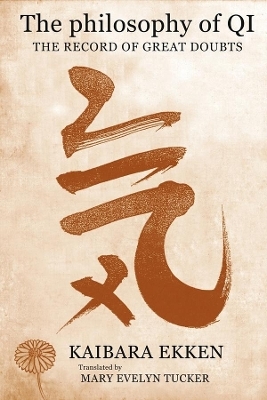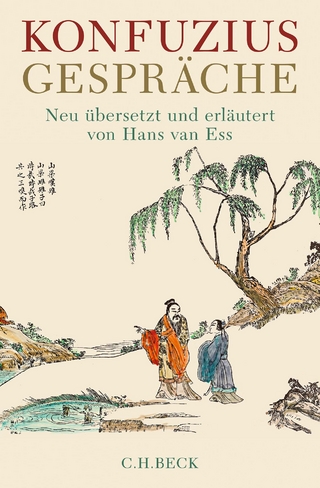
The Philosophy of Qi
Columbia University Press (Verlag)
978-0-231-13922-9 (ISBN)
- Titel z.Zt. nicht lieferbar
- Versandkostenfrei innerhalb Deutschlands
- Auch auf Rechnung
- Verfügbarkeit in der Filiale vor Ort prüfen
- Artikel merken
The Record of Great Doubts emphasizes the role of qi in achieving a life of engagement with other humans, with the larger society, and with nature as a whole. Rather than encourage transcendental escapism or quietism, Ekken articulates a philosophy of material force as a basis of living a life of commitment to the world. In this spirit, moral cultivation is not an isolated or a self-centered preoccupation, but an activity that occurs within the dynamic forces of nature and amid the rigorous demands of society. In this context, a vitalism of qi is an emergent force, not only providing the philosophical grounding for this vibrant interaction but also giving a basis for an investigation of the natural world that plumbs the principle within things. Ekken thus aimed to articulate a creative and dynamic milieu for moral education, political harmony, social coherence, and agricultural sustainability. The Record of Great Doubts embodies Ekken's profound commitment to Confucian ideas and practices as a method for establishing an integrative ethical vision, one he hoped would guide Japan through a new period of peace and stability.
A major philosophical treatise in the Japanese Neo-Confucian tradition, The Record of Great Doubts illuminates a crucial chapter in East Asian intellectual history.
Kaibara Ekken (1630-1714) was a prominent Japanese scholar who spread Neo-Confucian ideas and moral teachings throughout Japan. He was also known as the "Aristotle of Japan" for his studies of the natural world. Of his many writings, The Record of Great Doubts is the culmination of a lifetime of seeking a unified view of humans and nature. The text represents one of the central reflections in East Asian thought on the significance of qi ch'i, the material force coursing through all life, and is available here for the first time in English with a comprehensive introduction situating Ekken within the currents of his time and within the larger debates of Neo-Confucianism in East Asia. Mary Evelyn Tucker is visiting professor at Yale in the Institution for Social and Public Policy and the Yale School of Forestry and Environmental Studies. She is also a research associate at the Harvard-Yenching Institute and the Reischauer Institute of Japanese Studies at Harvard. She is the author of Moral and Spiritual Cultivation in Japanese Neo-Confucianism and is the coeditor of Confucianism and Ecology and of the two volume Confucian Spirituality. With John A. Grim, she is the director of the Forum on Religion and Ecology, an international project involving conferences, books, and a web site. Together the editors of the ten volume series World Religions and Ecology published by the Center for the Study of World Religions at Harvard.
Acknowledgments Introduction Taigiroku: The Record of Great Doubts Preface Part I On the Transmission of Confucian Thought (1-11) On Human Nature (12-14) On Bias, Discernment, and Selection (15-23) On Learning from What Is Close at Hand (24-28) The Indivisibility of the Nature of Heaven and Earth and One's Physical Nature (29) Acknowledging Differences with the Song Confucians (30-42) Part II Partiality in the Learning of the Song Confucians (43-46) Reverence Within and Righteousness Without (47-50) Influences from Buddhism and Daoism (51-60) A Discussion of the Metaphysical and the Physical (61) The Supreme Ultimate (62-66) The Way and Concrete Things (67-68) Returning the World to Humaneness (69) Reverence and Sincerity (70-71) Reverence as the Master of the Mind (72-80) The Inseparability of Principle and Material Force (81) Glossary Bibliography
| Erscheint lt. Verlag | 20.3.2007 |
|---|---|
| Reihe/Serie | Translations from the Asian Classics |
| Übersetzer | Mary Evelyn Tucker |
| Zusatzinfo | 27 illustrations |
| Verlagsort | New York |
| Sprache | englisch |
| Maße | 140 x 210 mm |
| Themenwelt | Geisteswissenschaften ► Philosophie ► Östliche Philosophie |
| ISBN-10 | 0-231-13922-5 / 0231139225 |
| ISBN-13 | 978-0-231-13922-9 / 9780231139229 |
| Zustand | Neuware |
| Haben Sie eine Frage zum Produkt? |
aus dem Bereich


